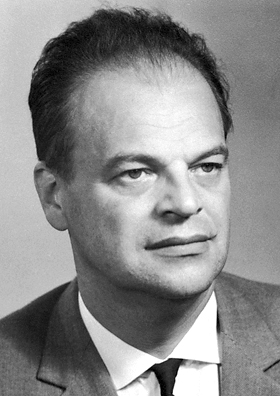Top Qs
Timeline
Chat
Perspective
Nikolay Basov
Soviet physicist From Wikipedia, the free encyclopedia
Remove ads
Nikolay Gennadiyevich Basov (Russian: Никола́й Генна́диевич Ба́сов; 14 December 1922 – 1 July 2001) was a Russian Soviet physicist and educator. For his fundamental work in the field of quantum electronics that led to the development of laser and maser, Basov shared the 1964 Nobel Prize in Physics with Alexander Prokhorov and Charles Hard Townes.[3]
Remove ads
Early life
Basov was born in the town of Usman, now in Lipetsk Oblast in 1922.[4] He finished school in 1941 in Voronezh, and was later called for military service at Kuibyshev Military Medical Academy. In 1943 he left the academy and served in the Red Army[4] participating in the Second World War with the 1st Ukrainian Front.
Professional career
Summarize
Perspective
Basov graduated from Moscow Engineering Physics Institute (MEPhI) in 1950. He then held a professorship at MEPhI and also worked in the Lebedev Physical Institute (LPI), where he defended a dissertation for the Candidate of Sciences degree (equivalent to PhD) in 1953 and a dissertation for the Doctor of Sciences degree in 1956. Basov was the Director of the LPI in 1973–1988. He was elected as corresponding member of the USSR Academy of Sciences (Russian Academy of Sciences since 1991) in 1962 and Full Member of the Academy in 1966.[1] In 1967, he was elected a Member of the Presidium of the Academy (1967—1990), and since 1990 he was the councillor of the Presidium of the USSR Academy of Sciences. In 1971 he was elected a Member of the German Academy of Sciences Leopoldina.[5] He was Honorary President and Member of the International Academy of Science, Munich.[6][7] He was the head of the laboratory of quantum radiophysics at the LPI until his death in 2001.[3]
In the early 1950s Basov and Prokhorov developed theoretical grounds for creation of a molecular oscillator and constructed such an oscillator based on ammonia. Later this oscillator became known as maser. They also proposed a method for the production of population inversion using inhomogeneous electric and magnetic fields. Their results were presented at a national conference in 1952 and published in 1954. Basov then proceeded to the development of laser, an analogous generator of coherent light. In 1955 he designed a three-level laser, and in 1959 suggested constructing a semiconductor laser, which he built with collaborators in 1963.[1] Basov with co-workers proposed Disk laser in 1966 [8] and realized experimentally the thin disk active mirror semiconductor lasers.[9] He developed with colleaguaes the first nonlinear theory of coherent addition of laser sets. [10] N.G.Basov encouraged the researchers in nonlinear optics in Lebedev Institute who discovered the optical phase conjugation. [11] Together with Lebedev Institute researchers he realized the robust method of the phase-locking of laser arrays via optical phase conjugation in Stimulated Brillouin scattering.[12] [13]
Basov's contributions to the development of the laser and maser, which won him the Nobel Prize in 1964, also led to new missile defense initiatives.[14]
He died on 1 July, 2001 at Moscow and was buried at Novodevichy Cemetery.
Remove ads
Politics
He entered politics in 1951[clarification needed] and became a member of parliament (the Soviet of the Union of the Supreme Soviet) in 1974.[4] Following U.S. President Ronald Reagan's speech on SDI in 1983, Basov signed a letter along with other Soviet scientists condemning the initiative, which was published in the New York Times.[15] In 1985 he declared the Soviet Union was capable of matching SDI proposals made by the U.S.[15] [clarification needed]
Books
- N. G. Basov, K. A. Brueckner (Editor-in-Chief), S. W. Haan, C. Yamanaka. Inertial Confinement Fusion, 1992, Research Trends in Physics Series published by the American Institute of Physics Press (presently Springer, New York). ISBN 0-88318-925-9.
- V. Stefan and N. G. Basov (Editors). Semiconductor Science and Technology, Volume 1. Semiconductor Lasers. (Stefan University Press Series on Frontiers in Science and Technology) (Paperback), 1999. ISBN 1-889545-11-2.
- V. Stefan and N. G. Basov (Editors). Semiconductor Science and Technology, Volume 2: Quantum Dots and Quantum Wells. (Stefan University Press Series on Frontiers in Science and Technology) (Paperback), 1999. ISBN 1-889545-12-0.
Remove ads
Awards and honours


- Lenin Prize (1959)
- Nobel Prize in Physics (1964, with the pioneering work done in the field of quantum electronics)
- Hero of Socialist Labour — twice (1969, 1982)
- Gold Medal of the Czechoslovak Academy of Sciences (1975)
- A. Volta Gold Medal (1977)
- Kalinga Prize (1986)
- USSR State Prize (1989)
- Lomonosov Grand Gold Medal, Moscow State University (1990)
- Order of Lenin – five times
- Order of Merit for the Fatherland, 2nd class
- Order of the Patriotic War, 2nd class
Remove ads
See also
References
External links
Wikiwand - on
Seamless Wikipedia browsing. On steroids.
Remove ads

